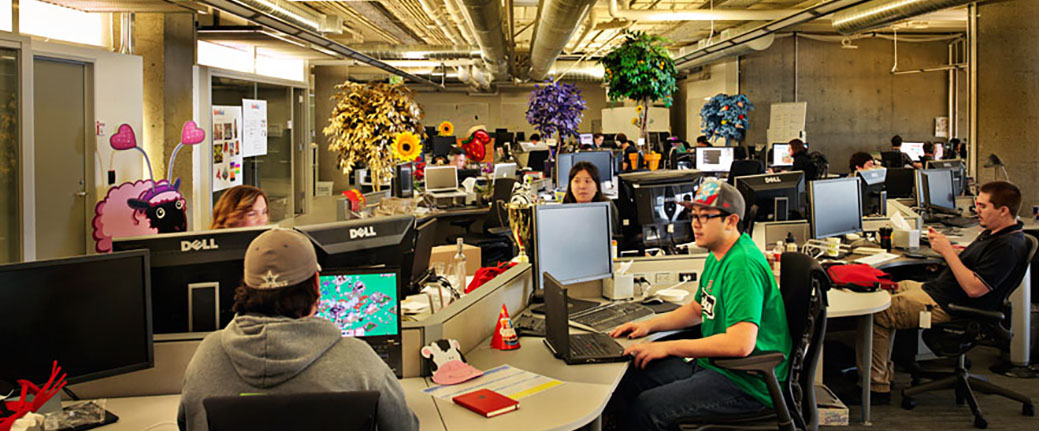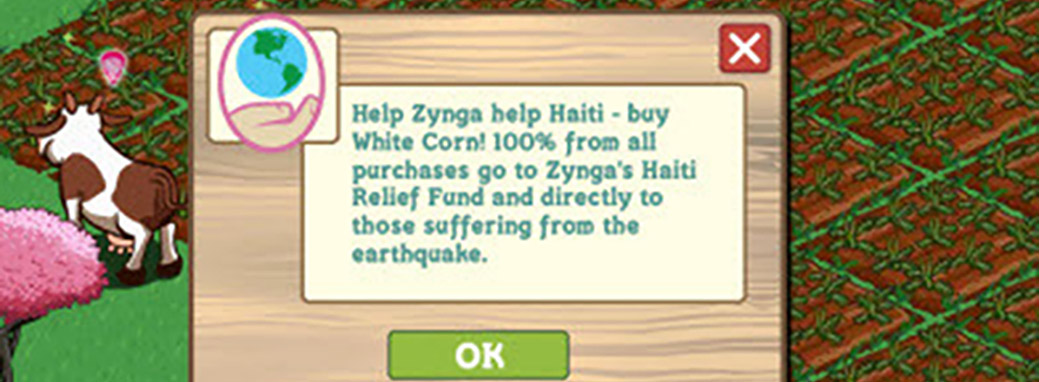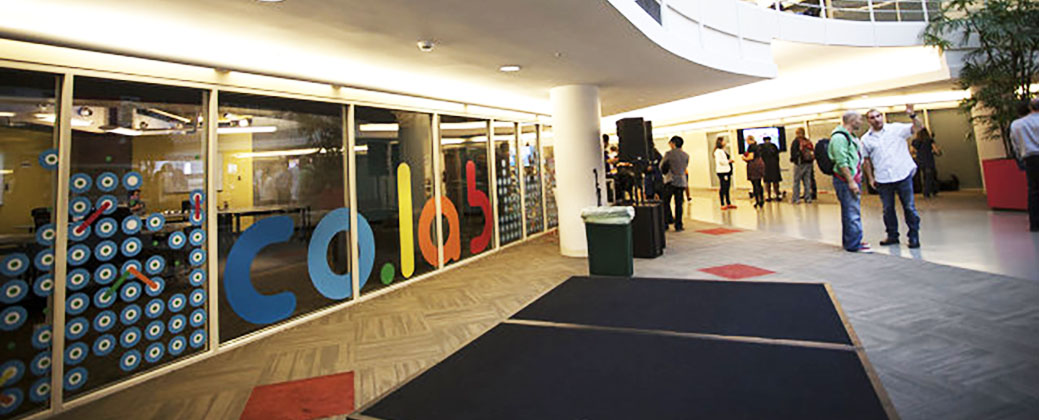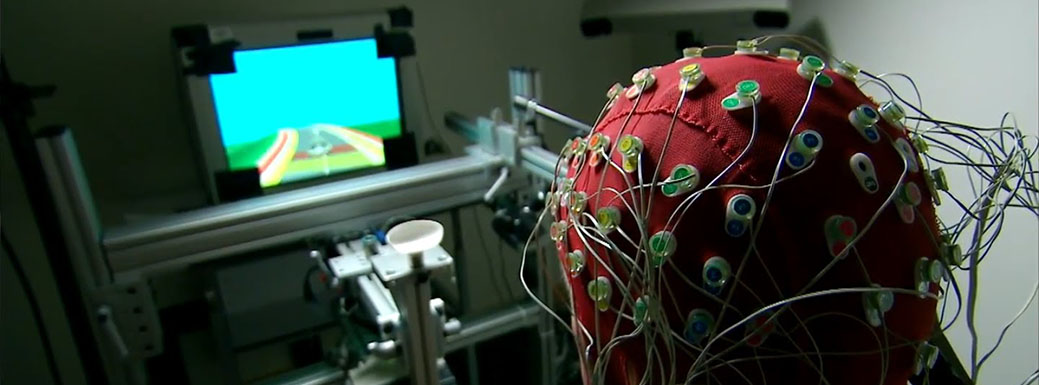
You get really close to the power of games when you see the way a community responds to a crisis or you see the light go on in a players eyes when they learn something and unlock the game.
— Abby Speight, Zynga.org
Zynga.org
SXSW Gaming
- Zynga.org’s Abby Speight will discuss the efforts of commercial game firms to give back during a session Thursday, March 17 at SXSW Gaming.
- The panel is from 3:30-4:30 in the Austin Convention Center Rooms 4abc.
- More info at SXSW Gaming
From battling gangsters to raising healthy sheep, Zynga has grown a brand known for its addicting games and social interaction. Its developers have built some of the most successful Facebook and social games from the past decade. It has also built a multifaceted effort to give back to the community through its games and a series of creative programs that allow developers to work with startups looking to unlock the power of games to teach and inspire.
Unlike many Corporate Social Responsibility efforts, Zynga’s non-profit work grew not out of a mandate from the top but rather from the developers and project managers who saw opportunities to engage the community of gamers and partner with organizations that could benefit from Zynga’s expertise.
Players of Zynga games are on the cusp of having donated $25 million to various aid agencies, relief efforts and nonprofits through in-game donations. The learning game incubator Co.Lab has paired Zynga product managers and experts with startups looking to develop game to remake education. The organization’s Studio G has partnered with Gazzaley Lab, a cognitive neuroscience research lab at the University of California at San Francisco, to study the way games change the mind.
“You get really close to the power of games when you see the way a community responds to a crisis or you see the light go on in a players eyes when they learn something and unlock the game,” Abby Speight, director of product at the nonprofit Zynga.org, said recently.

Born in Crisis
Zynga broke through as a game maker in 2009 when its game FarmVille attracted some 10 million players in the first six weeks it was live.
The game was a Facebook phenomena and so when a devastating earthquake struck Haiti in January 2010 the company had a sizable user base who was spending money to build things together. It was not a big step to move from building social farms together to helping rebuild a country and in that moment Zynga’s nonprofit idea was born.
FarmVille had already launched “Sweet Seeds for Haiti,” an in-game campaign that allowed players to purchase and plant special virtual seeds that never withered. The campaign soon brought in some $1.5 million, helping rebuild schools and help the impoverished nation. It also served as the backbone of an effort to respond to the 2010 disaster.
VIDEO: Zynga Aids Japan after Quake
In response to the Haiti quake and then the Japanese tsunami in early 2011, Zynga players soon poured $5 million in support into nonprofit partners.
Zynga.org was launched in 2011 to coordinate these efforts and find ways to connect what Zynga does well with organizations that can help people.
“We started with the charitable features of our game because that allowed us to reach players where they were and make the idea of giving part of the game experience,” Speight said. “The idea was clear, direct and tangible.”
Zynga soon made a name for itself for seamlessly embedding social good efforts directly into their games. Speight said the success was part a result of Zynga’s structure and part luck.
“Where we got lucky with that charitable in-game experience was we just got there first,” she said, adding, “We are a group that’s quick-moving and ready to try new things and so were our players and that helped us get there first.”
That idea of tapping the virtual communities to raise money and awareness took off and became a hallmark of the company’s CSR efforts, but it was more important than that.
The success of in-game donations inspired the company to broaden its thinking about how to use their success to do more to help others.

These companies are super resource-constrained. They can’t buy their way through a problem and that makes you a better product manager.
— Josh Lu, Zynga Product Manager
In the Lab
A couple years after starting their in-game donation efforts Zynga took a major step in helping other developers create games that could change the way kids learn by launching co.lab.
Co.lab is an accelerator aimed at learning games and helping those games scale.
In announcing the new effort, Zynga co-founder Mark Pincus said, “We really believe games can be a force for good–not just for good fun, not just for good entertainment, but to help people grow their minds more than they could watching TV.”
The new group, headed by veteran startup chief Esteban Sosnik brought in a team of developers, usually at the early seed stage, to develop their learning games and work with product managers and other experts from Zynga refine their work.
“We are really hoping to be a hub, a community of people who want to not just make great games, but also change the way children learn,” Sosnik said at the time.
Speight said that from the Zynga side of the equation co.lab offered tremendous opportunities to those developers within the game giant.
“Those people who worked with the firms in co.lab can see they are making an important impact,” she said. “They get to develop new skills, take on new leadership challenges and have a safe space to try new things out.”
One of those early product managers to cross over from Zynga to co.lab to work with these startups was Josh Lu.
“There is something great about helping these companies that want to improve the lives of kids,” Lu said, adding that his work has been incredibly fulfilling.
But that is not to say it’s been easy.
He remembers the first time he was paired with one of the co.lab companies and he began working with them to explore their analytics and what that could tell them about their gameplay.
“We were used to having terabytes of data and millions of players to mine for data and suddenly we had a pool of 1,000 players or 10,000 gameplays to explore, he said. “We learned a lot about finding new ways to get the answers we needed and how to be a lot more scrappy.”
Lu said that his work with the co.lab companies taught him and other mentors how to be creative problem-solvers and how to find solutions in unorthodox ways, both critical skills they took back to their day jobs.
Lu and others soon found themselves teaching core business and startup practices to teams that were more interested in the potential impact of their games than in the process of running a business.
“The founders of these companies are not your typical entrepreneurs and so many of them had not been through the process of building a team, hiring and creating a compelling case for their product,” Lu said.
Although it started as a sort-of moonlighting gig for those employees looking to have a broader impact for their work Lu said projects like co.lab are now a major selling point for new employees considering Zynga.
“People know about co.lab here and are constantly coming up to talk to me about what we are doing or how they can get involved,” he said. “The employees here are really proud of the work we are doing.”

Mind Games
Perhaps it is natural that with the success of co.lab and the impact Zynga team members had already had working with learning game startups that the newest venture for Zynga’s nonprofit work should be another collaboration with another local organization working to explore the impact of gaming.
This project has partnered an experiment group inside Zynga known as Studio G with the Gazzaley lab, a cognitive neuroscience research lab at the University of California, San Francisco focused on studying the neural mechanisms of memory, attention and perception. Gazzaley has been exploring the how gaming can help improve the function of the brain. The group is at the bleeding edge of neural science but their games were often built with the experiment in mind. Zynga realized that it could help with the design and move pilot games from concept to development.
The two have worked on two games, including Meditrain, which takes the principles of meditation and integrates them with the game principles of adaptivity so players can better self-regulate.
“It’s the beautiful strange marriage of fast-paced Zynga designers who are used to rapid prototyping with the rigorous research and strict academic work of Gazzaley,” said Speight.
The two continue to work together, developing a new game for the Oculus Rift set to be released in 2016.
Across all these efforts – the charitable in-game giving, the mentoring of new firms in co.lab and the work with Gazzaley Labs through Studio G – Zynga has built its CSR efforts organically, trying to allow the skills the firm developed in social gaming drive the nonprofit and community-oriented projects it takes on.
The company has built a multifaceted approach to what most places would call its CSR efforts, developing projects that inspire their players to give back as well as to develop new skills among their designers and product managers.
How best game firms can mix profit with impact will, including the work of Zynga, is the focus of a session at this week’s SXSW Gaming conference. Speight will join Entertainment Software Association chief Erik Huey and Games for Change’s President Susanna Pollack to discuss the successes and failures of commercial efforts to develop games for good, and what lessons other developers and investors can learn. The session is Thursday March 17 from 3:30-4:30 in the Austin Convention Center Rooms 4abc.
